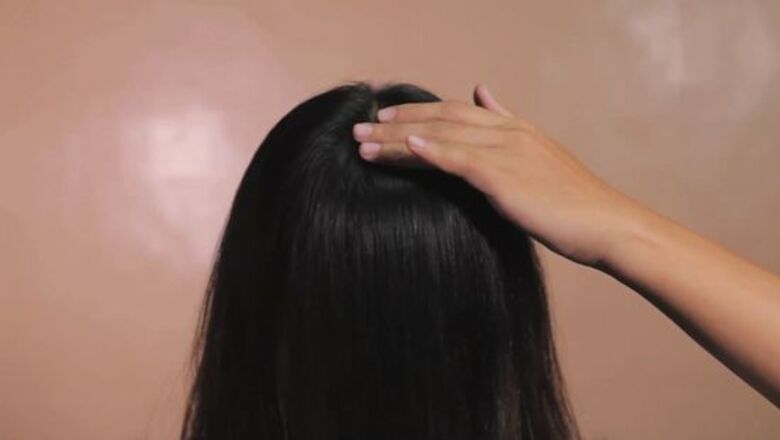
views
Creating Face-Framing Bangs
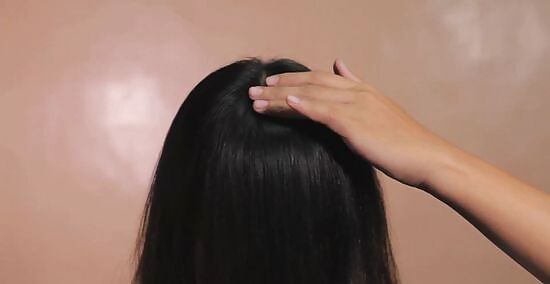
Use a comb to section off the front part of your hair. Gather the hair at the front part of your head, with the center around the middle of the top part of your scalp. This should be about a quarter of your hair. Use a comb to create a neat, V-shaped part along the sides of the section, with the top of the V in the middle. For an extra tidy part, you can use the pointed end of a rat-tail comb as a guide.
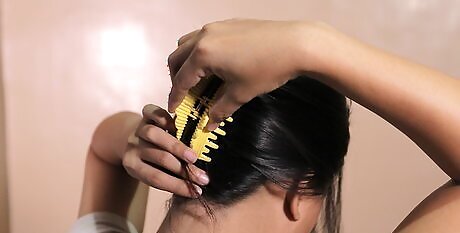
Tie or clip back the rest of your hair. Use a hair-safe elastic band to tie your hair back in a ponytail. If your hair is too short to tie back, clip the sides back with hair clips. This will keep the rest of your hair from getting in your way as you cut your bangs. Avoid using a rubber band to tie back your hair, since this can cause damage. Look for a soft, no-crease hair elastic.
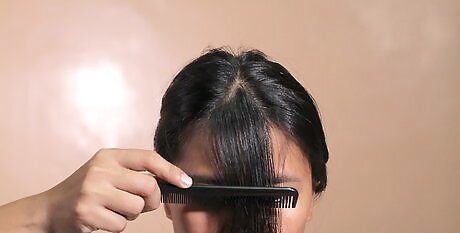
Comb out the front section of your hair. Run a comb through the hair you wish to cut until it is lying neat and flat against your face. This will make it easier for you to achieve an even cut and see exactly where your bangs need to be trimmed. If you like, at this point you can mist your hair with a little water or prep spray to add moisture and make your hair a bit easier to control. However, keep in mind that your bangs may turn out shorter than you expect if you cut them while they're wet. Wet hair stretches and then shrinks after it dries. If you have curly hair, then this will be even more noticeable.
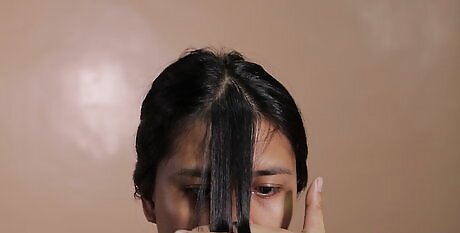
Pinch your hair with your fingers to mark where you want to cut. Take your combed section of hair and pinch it between your index and middle fingers, holding them as if they were scissors. Your hand should be in a horizontal position, parallel to the floor. Slide your fingers down the length of your hair until you reach the point on your face where you want your bangs to fall. If you are cutting damp hair, give it a little extra length, since the bangs will rest higher up when your hair is dry. This is especially true if your hair is curly, since the difference between wet and dry hair may be as much as a couple inches (or a few centimeters). You can also use your comb as a guide instead of your fingers. Push the comb into your hair from the back and pull it straight down to the level where you want your bangs to fall (e.g., just grazing the tops of your eyes).
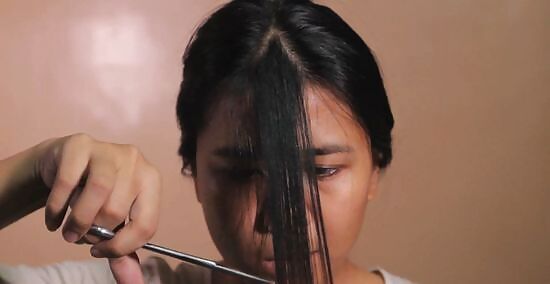
Cut upwards into your bangs with sharp, hair-cutting scissors. With your fingers or comb still in place to guide your cuts, start making 0.5 to 1 in (1.3 to 2.5 cm) vertical snips into your hair. Start at the center and work your way out to each side. Cut just below your fingers or the comb. For a natural, feathery look, make your cuts at a slight angle.
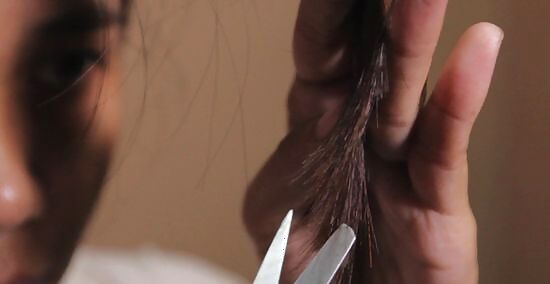
Check for any uneven ends and trim them. After you finish cutting your bangs, pull them straight again with your fingers or your comb. If you see any errant strands, carefully snip them to the desired length. If the strands on either side of your bangs are uneven in length, grab the locks on both sides and cross them over the middle so that the ends meet up at the center of your bangs. Trim the longer strand so that the 2 sides match.
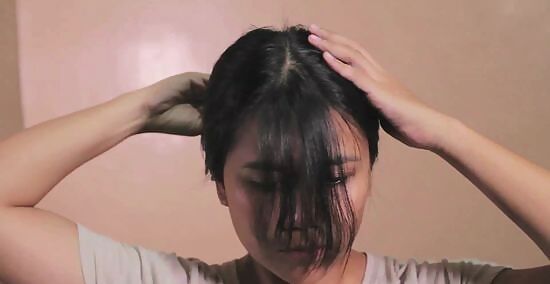
Let the rest of your hair down and part it into quarters. Once you've gotten the center of your bangs the way you want them, it's time to blend them with the rest of your hair. Untie or unclip your hair and create a center part. Your hair should be framing your face in 2 equal sections. Make a second part across the top of your head, from ear to ear. Once you've separated your hair into 4 equal sections, tie or clip back the hair behind the second (side-to-side) part.
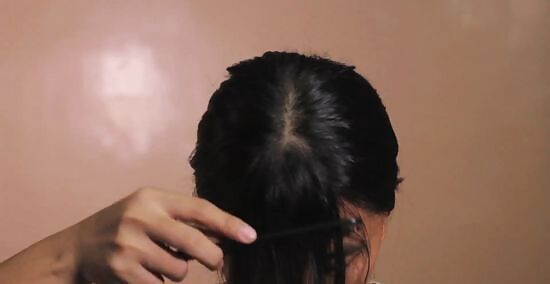
Comb out all the loose hair. Run your comb or your fingers through your bangs and side hair so that it all hangs down and lies flat. You will be blending your bangs into the hair on either side, so combing it out will help you see where you need to start cutting to make the transition. If your hair is curly, use a wide-tooth comb to prevent damage. Work out any tangles from the bottom up before combing through the full length of your hair.
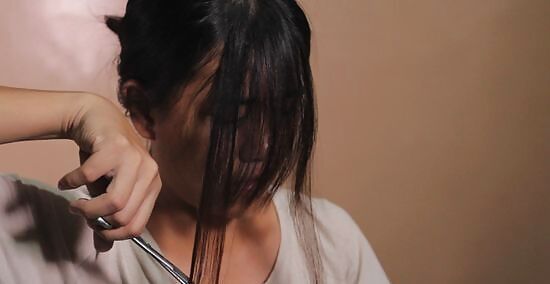
Blend your bangs into your side hair by trimming down at an angle. Gently pull the side hair straight with your fingers or a comb to create tension. Starting at one edge of your bangs, trim downward into your hair at a roughly 45° angle. When you're done with one side, switch to the other. Brush or comb your hair out to check for any messy or uneven spots, and tidy them up with your scissors.
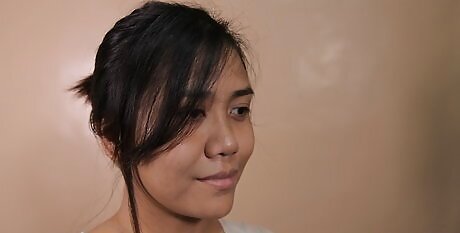
Style your bangs according to your preference. This versatile style can be worn with your bangs parted or swept to one side. If you cut your center bangs short enough, you can also allow them to hang straight down in the middle for a classic fringe. For a little extra volume, you can blow dry your bangs with a round brush. Use a small round brush for small curls and a large round brush for big curls. Start with the brush under your bangs at the roots, and curl the hair down and forward. Blow dry your bangs from above.
Layering Bangs with the Twist Technique
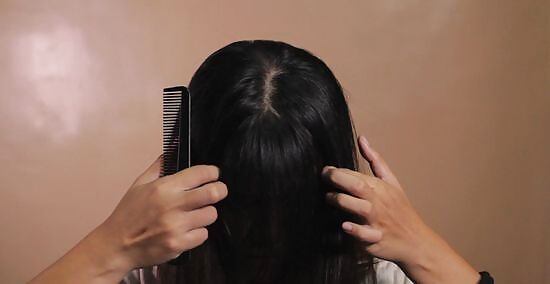
Part your hair across the top of your head. Using a comb, part your hair horizontally across the top of your head, starting from one side of your hairline (at the temple) to the other. You should end up with a half-moon shape, with the highest part of the arch around the middle of your scalp. For extra control, spritz your hair with a little water or prep spray if you like. If you do this, give your bangs a little extra length to account for shrinking as they dry.
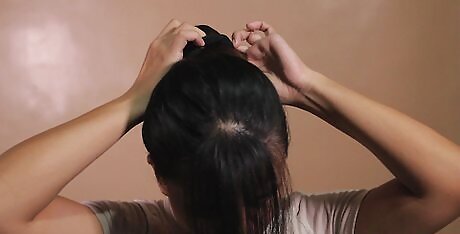
Tie or clip back the hair behind the part. Once your part is made, pull back any hair that you don't want to cut. If it's too short to tie into a ponytail, clip the sides back with hair clips. Be sure to use a hair-safe elastic when tying back your hair.
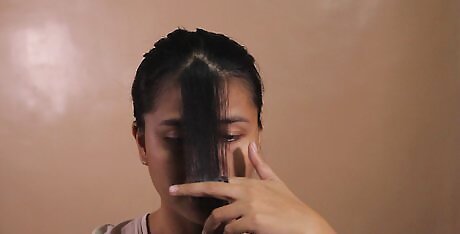
Slide your fingers down the section of hair to the desired length. Carefully comb out the section of hair you'd like to cut. Then, pinch the hair between the index and middle finger of your dominant hand, keeping your hand horizontal and parallel to the floor. Pull your fingers down the hair until you reach the level where you'd like the middle of your bangs to fall. Make sure to keep your hand horizontal, or your cut will be uneven. If you'd like bangs that graze the tops of your eyes, pinch your hair between your eyebrows or right at the bridge of your nose. For longer bangs, go lower. If your hair is wavy or curly, cut a little lower than where you would like your bangs to hang after they're cut.
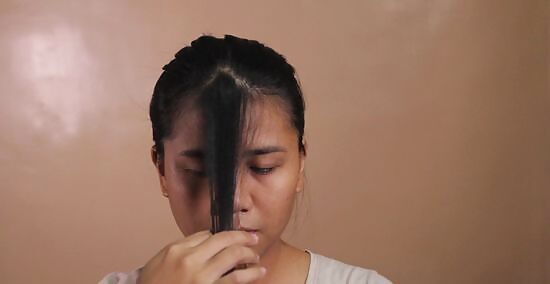
Turn your hand so that your fingers are pointing at your face. This is the first step of creating the twist. Keep your hand level with the floor, and make a 90° turn, so that your fingertips rest lightly against your face at the level where you'd like to cut. For example, if you are cutting your bangs at eye level, your fingertips should be resting between your eyebrows or just at the top of the bridge of your nose.
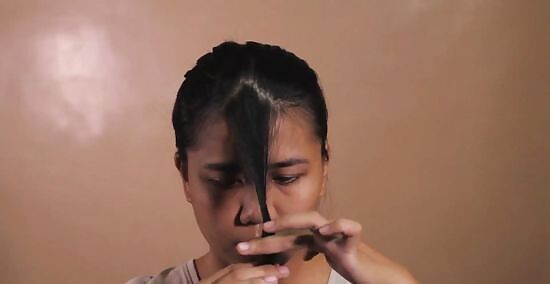
Pinch the hair with your other hand and complete the twist. Take the hair between the index and middle fingers of your non-dominant hand, placing them just above the fingers of your dominant hand. Once you've switched the hair to your other hand, make a second 90° turn so that you've given your hair a full twist. Make sure to keep your other hand level and parallel with the floor. Add more twists if you'd like a more layered, feathery effect.
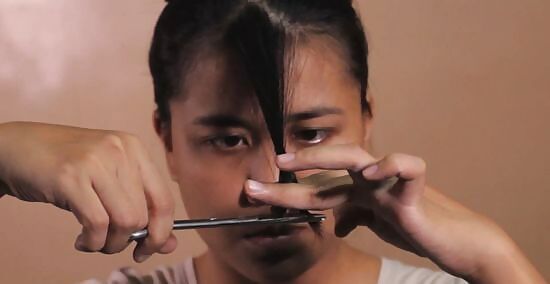
Cut the hair straight across just below your fingers. Using a pair of sharp hair scissors, snip the hair straight across in a horizontal line right beneath where you have it pinched between your fingers. Once you've made the cut, release your hair from between your fingers. You should have bangs that arch gently, with the highest point in the middle and the most length on either side. Take care not to pull the hair away from your face as you cut. The finger nearest to your face should be resting against your face.
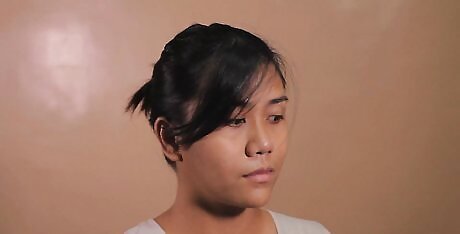
Comb out your new bangs and make adjustments if needed. Check to make sure that the bangs are even and you like where they fall. If you wish, you can retwist the hair and make small, vertical snips into the ends to soften them up. Style the bangs with a round brush and blowdryer if you'd like a little extra volume. You can either let these bangs hang down across your forehead, or part them gently in the middle for a “curtain” effect.
Cutting Long Side-Swept Bangs
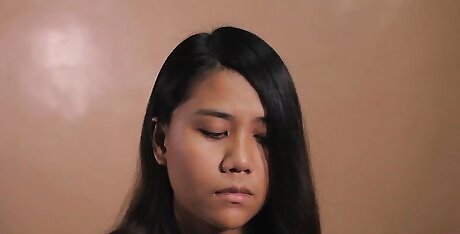
Make a deep side part in your hair. Decide which way you'd like your side-bangs to go, and make a part on the opposite side of your hair. Use a comb to make a straight part, starting at your hairline above your eyebrow on the desired side. For example, if you want your bangs to sweep off to the right, make the part above your left eyebrow.
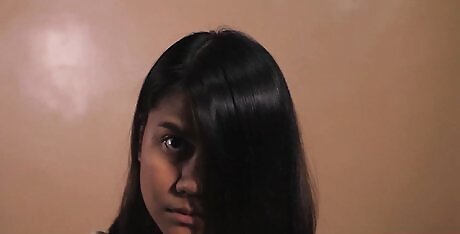
Pull out the section of hair you would like to cut. Starting on the opposite side of your hairline from the part, section off however much of your front hair you would like to include in your side bangs. Tuck the rest of your hair on that side behind your ear. Don't clip or tie any of your hair back at this point, since you may need to adjust which hair is included in your bangs as you define the section.
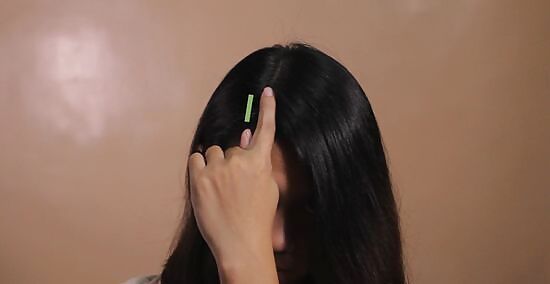
Put your index finger on your part. Rest your second knuckle at the hairline, and keep your finger parallel to the side part. The tip of your finger will serve as a guide as you begin to make the second, angled part that will define the section you are cutting. Use your non-dominant hand for this, so that your other hand will be free to use your comb.
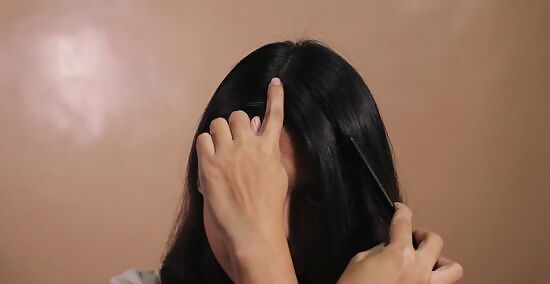
Place your comb level with the tip of your finger and comb down. Take your comb and line the end of it up with the tip of your index finger. Hold the comb at a slight downward angle relative to your finger, sloping away from your part. Find the highest point of your eyebrow's arch beneath the comb, and comb your hair downward from just above that point. You should end up with a second, diagonal part, at about a 45° angle from your first side part.
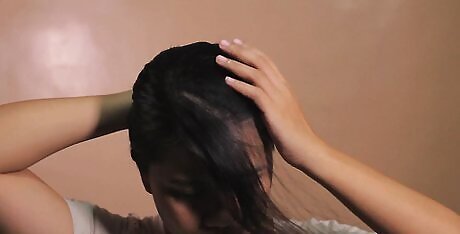
Clip the rest of your hair back. Once you've defined your section, use a hair clip to keep the hair behind the bangs out of the way. You could also tie the rest of your hair back into a ponytail if you prefer. You may only need to clip back the hair on the side where you are cutting your bangs.
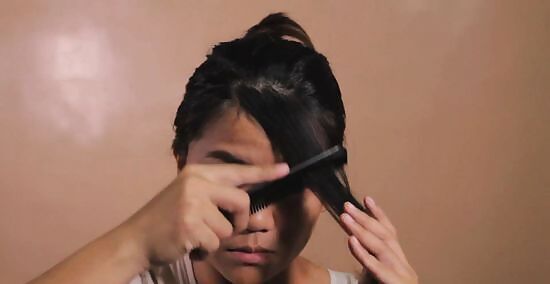
Comb through the section and pull it tight before cutting. Run the comb through your bang section from behind once or twice, then pinch the hair in place with your middle and index finger to gently pull it taut. This will help you create a strong, well-defined angle once you're ready to make the cut. If you like, you can spritz the hair lightly with a little prep spray at this point to make it more manageable.
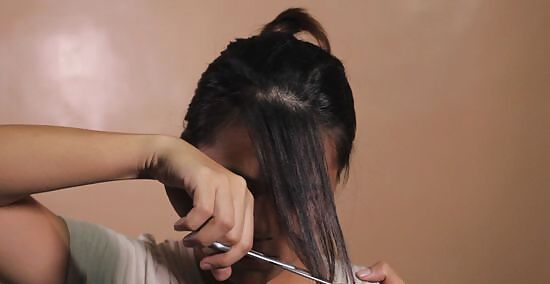
Cut your hair at a downward angle, starting beneath your side part. Depending on how long you want the bangs to be, start cutting somewhere between the tip of your nose and your upper lip. Use sharp hair scissors, and make your cut parallel to the second, angled part that you created when you sectioned off your bangs. If you start the cut at the tip of your nose, the shortest edge of your bangs will graze the top of your eyebrow when you sweep them to the side. If you start the cut at your upper lip, the short edge will rest on your cheek bone. Use as few snips as possible to make the cut.
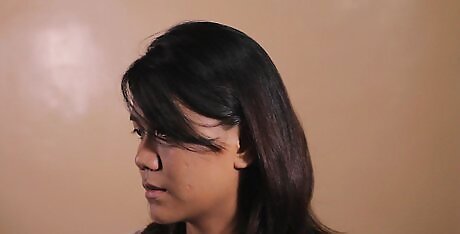
Examine your new bangs and do any necessary cleanup. Once you've made the cut, check for any stray uneven hairs and snip them off. Brush your bangs to the side to see how they fall. Try styling your new bangs with a round brush and blowdryer.










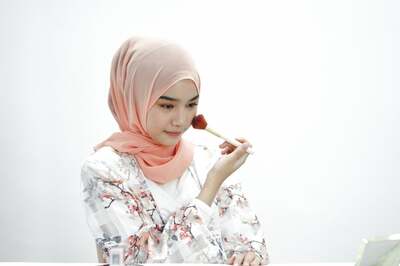

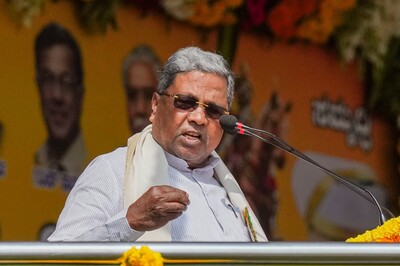




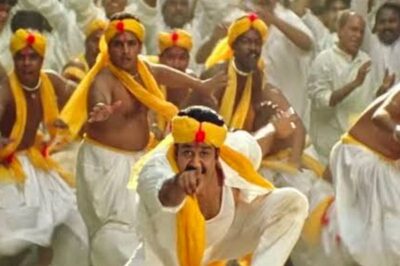
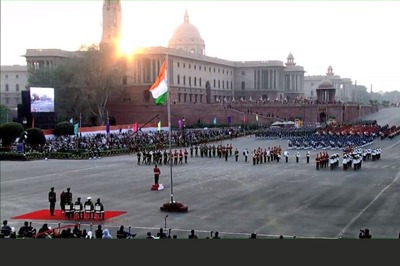

Comments
0 comment